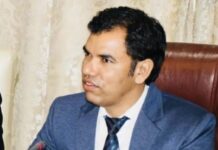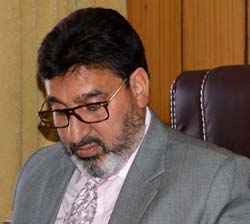KL NEWS NETWORK
SRINAGAR

Former Indian ambassador to various countries, Independent Director, Oil and Natural Gas Corporation (ONGC) and Distinguished Fellow & Senior Adviser (Climate Change), TERI, Ajai Malhotra Tuesday said that rapid and unplanned urbanization, encroachment of Valley wetlands and flood basins, and deforestation in the Jhelum River basin leading to silt accumulation in Srinagar’s water bodies primarily contributed towards the 2014 devastating floods that wreaked havoc in Srinagar and other areas of Jammu and Kashmir.
Ajai Malhotra said this while delivering a sponsored special lecture on “Tackling the Climate Change Confronting India,” organised by the Ministry of External Affairs in association with the Central University of Kashmir (CUK) at Nowgam-I academic block of the varsity, a varsity statement said this evening.
He said, “Houses have been built on floodplains and river beds, making drainage systems inadequate and reducing natural water storage areas. Channels leading into nearby wetlands have narrowed considerably over the last century due to encroaching structures. Nallahs have been replaced by roads and shops, wetlands have metamorphosed into residential colonies,” adding that reviving Srinagar’s natural drainage channels to serve as water drain is hugely important.
“An effective early warning system and accompanying response plan would be also crucial,” he further said.
He said that scientific evidence affirms that anthropogenic emission of Greenhouse Gases (GHGs), such as carbon dioxide, methane, nitrous oxide and several industrial gases, since the Industrial Revolution that started two and a half centuries ago have been changing the Earth’s climate.
“There is now overwhelming scientific certainty that increasing GHG concentration in the atmosphere due to human activities has been the dominant cause of the observed warming of our planet since 1950. Over the years, the atmosphere and oceans have warmed. Snow, ice, permafrost and glaciers have reduced at the poles and elsewhere. Sea level has risen and oceans have become more acidic by absorbing more CO2. Several extreme weather events have intensified. Current GHG emissions are the highest in human history while atmospheric CO2 is at its highest level since at least 800,000 years. Over the last century, global temperatures have risen +0.8°C and sea levels by 20 centimetres. It is now over three decades that the world has not had a month when temperatures were below average. The rising temperature of recent years, rather than the relative stability of the past, has become routine. Irrespective of future GHG emissions, further warming is inevitable and more dramatic modifications could follow in our lifetime unless we urgently take corrective steps,” he added.
Vice-Chancellor, Prof Mehraj ud Din while addressing the gathering said, “those who are young, might not be aware about the demography of Kashmir and Srinagar in particular, what it was 30 years back. Citing an example of Nalae Maaer, he said “we used to see the boats carrying vegetables and rowing from one place to another in clear water. Now today it is in the form of a road on which houses and shops have been constructed around it. Those residing know what they are facing over last three decades due to supposed modernization.”
Commenting on the deteriorating condition of Dal Lake, he said, “the water was used for drinking, and now it can’t be even used for washing hands. The lake is also shrinking towards extinction due to our apathy. We all have failed to restore the pristine glory of the Dal Lake.”
About the global warming, Prof Mehraj ud Din Mir said that it is not only the developed countries, but the developing countries and underdeveloped countries are also contributing towards this major issue.
Former vice-chancellor, University of Kashmir and Pondicherry University, Prof Jalees Ahmad Khan Tareen, described the lecture of Ajai Malhotra as “thought provoking and based on analytical data giving detailed account about the global warming”.
“The developed countries have over the past 80 years have contributed to create the consequences which we are seeing today. The lavish use of natural resources, for example the wood is sufficient to wipe out the half the Indian forests. The onus and responsibility to safeguard the environment squarely lies on developed countries,” he said.
He added that the West has found alternative form of energy, but it is impressing upon other countries to avoid using fossil fuels. Prof Tareen underscored the need of preserving the water bodies and wetlands.
Meanwhile, the Examination and Evaluation Wing (EEW) of the Central University of Kashmir (CUK) is organizing the 5th Post-ESE Workshop on Examinations and Evaluation Reforms: Contemporary Challenges & Responses at Nowgam-I academic block of the varsity on Thursday, May 12, 2016.
According to the EEW, through this platform the faculty will share experiences and thoughts mutually about the workshop theme. Besides, inaugural in the morning and a special session by an invited faculty of eminence, the workshop will be spread over one technical session and a workshop group exercise.
Former Vice-Chancellor, University of Kashmir, Pondicherry University and B S Abdur Rahman University of Science & Technology, Prof Jalees A Khan Tareen, will inaugurate the workshop and present a keynote address on “Parameters of World Class Universities”. This special session by the invited faculty will be an integral component of the workshop.
“It is pertinent to mention here that the Post-ESE workshops conducted till now have far reaching academic implications by setting a trend toward creating a culture of best practices in the University .The present workshop, 5th in the series, is also expected to act as a morale booster for the faculty and staff associated with the examinations and evaluation. Further, by organizing this workshop, a requirement under NAAC is also fulfilled,” Controller of Examinations, Dr Nazir Ahmad Gilkar said.
He said the objectives of workshop is: To introspect and improve upon further the Examination and Evaluation System; to provide necessary space for interaction to the faculty across all Teaching Departments; to avail an opportunity to listen to an eminent educationist in the country; to consider various Educational-Examination-Assessment issues and learn from experiences and exposures; and to ensure that valued outcome of the workshop deliberations is utilized effectively during the course of forth-coming End Semester Examinations.















